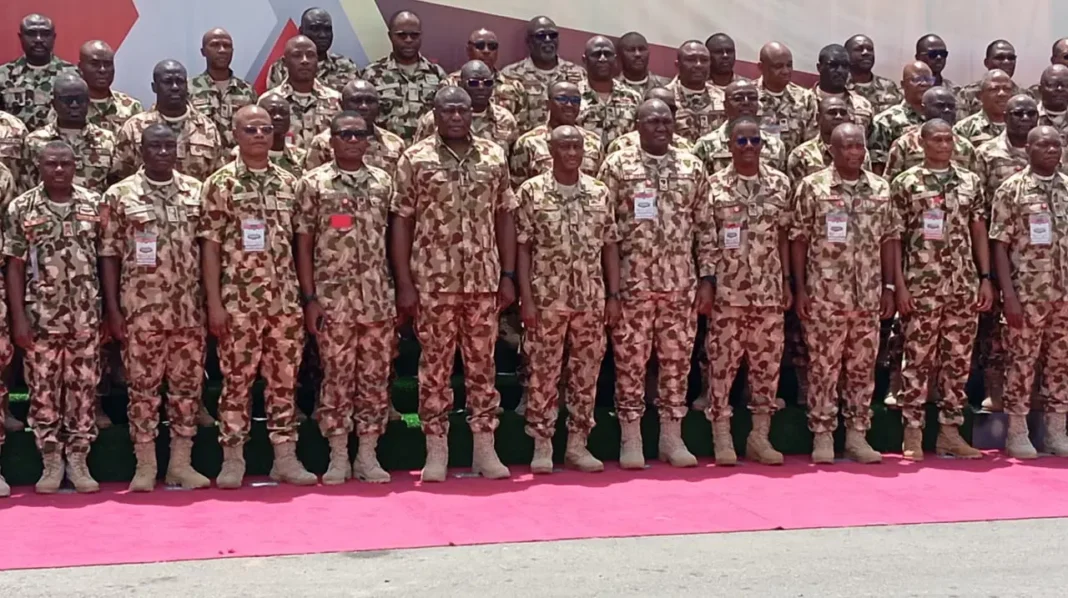COAS Vows to Bolster Operations with More Combat Enablers…The Chief of Army Staff (COAS), Lieutenant General Taoreed Lagbaja, has reiterated the Nigerian Army’s commitment to strengthening its operational capacity through the induction of more combat enablers into various theatres of operation across the country.
This strategic move, he noted, is aimed at equipping troops with the necessary tools to more effectively combat the nation’s evolving security threats.
Speaking during a military engagement, General Lagbaja emphasized that the army’s recent acquisitions are already making a tangible difference on the front lines.
Among these are Mine-Resistant Ambush Protected (MRAP) vehicles, modern rifles, and a range of ammunition.
These new tools have not only increased troop survivability but have also enhanced the overall effectiveness of military operations in challenging terrains and high-risk zones.
In addition to physical assets, the COAS revealed that the army is also making significant strides in non-kinetic warfare capabilities.
Notably, the Nigerian Army has developed its capacity in electronic warfare and cyber operations, an area that is increasingly crucial in contemporary conflict.
The establishment of the Nigerian Army Cyber Warfare Command and its accompanying school underscore a clear intent to prepare troops for the complexities of cyber conflict and to safeguard critical national infrastructure from digital threats.
Lagbaja pointed out that this shift towards a more technologically advanced force is necessary in order to keep pace with the changing nature of warfare.
He explained that future conflicts will not only be fought with guns and tanks but also with code and algorithms.
Therefore, the Army’s embrace of cybersecurity and electronic warfare is not only forward-thinking but essential to national defense.
While enhancing its technological capabilities, the Nigerian Army is also focusing on improving human capacity.
General Lagbaja stressed the importance of ongoing training and leadership development, especially for officers in command positions.
He made this known during the 2024 1st Commanding Officers Workshop held in Sokoto, a platform designed to sharpen the skills of mid-level commanders and prepare them for the complex realities of modern military operations.
The COAS urged commanders to remain committed to continuous troop training, which he described as a crucial pillar for operational success.
He called on them to foster discipline, strategic thinking, and adaptability among their ranks, especially in the face of multifaceted security challenges such as terrorism, banditry, and kidnapping.
Moreover, General Lagbaja reaffirmed the Nigerian Army’s stance on professionalism, neutrality, and respect for human rights.
He assured the public that all operations would be conducted within the framework of legality and ethical responsibility.
According to him, the newly inducted assets will be deployed in a manner that not only strengthens security but also upholds the dignity of civilians in affected areas.
As Nigeria continues to grapple with persistent insecurity in various regions, the Army’s approach marks a significant shift towards a more integrated and modern fighting force.
The decision to invest in both material resources and human capital indicates a balanced strategy that aims to enhance immediate operational capacity while also laying the groundwork for long-term security resilience.
READ MORE: Experts Blame AI and Social Media Abuse for Decline in Students’ Academic Performance
Lagbaja’s address signals a clear message: the Nigerian Army is evolving.
With a more equipped and better-trained force, supported by advanced technologies and a renewed commitment to ethical standards, the military is positioning itself to better confront and overcome the security challenges that have plagued the nation.
These developments reflect a broader vision of a professional and capable military, one that is ready not only to defend the nation’s borders but also to ensure internal stability and support national development.




